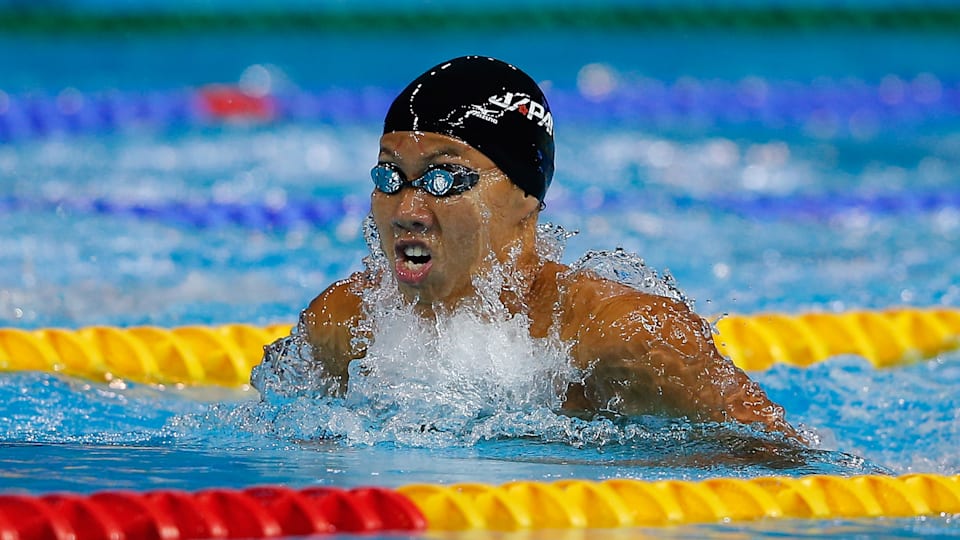
As well as setting a world record of 2:06.67 over 200m at the Kosuke Kitajima Cup in Tokyo in January 2017 – becoming the first man to swim sub-2:07 – Watanabe won at the 2018 Pan Pacific Championships and finished second behind compatriot Yasuhiro Koseki at the 2018 Asian Games.
At the age of just 19, he also competed at the Olympic Games Rio 2016, breaking the Olympic record in the semi-finals before going on to finish sixth in the final. Now aged 22, Watanabe will be among the favourites to make the 200m podium at this month’s World Aquatics Championships in Gwangju (Republic of Korea), where he will be aiming to improve on the bronze medal he won in the 2017 edition of the event.
Five years ago, you won a gold medal in the 200m breaststroke at the YOG. What are your memories of Nanjing?
“Before Nanjing started, it had already been announced that Tokyo would host the 2020 Olympic Games, so I had a special feeling about going to the Games. The experiences I had at the YOG and the Olympic Games in Rio really impact my performances now. The victory at the YOG gave me a lot of confidence. After experiencing the YOG, the feeling that I wanted to participate in the Olympic Games became stronger and stronger.”
Were you able to get to know athletes from other countries during the Games?
“At the time of the YOG, I didn’t have a lot of communication with other athletes. But when I look at the World Championships this year, there will be some of my rivals who competed in Nanjing. We will compete against each other again, so that’s really interesting.”
The Olympic Games Tokyo 2020 will obviously be held in your home country, which must give you great motivation. Having already competed in Rio, how do you feel about heading into the Games next year, and what is your goal?
“At the Olympic Games Rio 2016, I broke the Olympic record but my ranking was sixth at the end, which was disappointing. For the Olympic Games Tokyo 2020, I want to improve on my world record and Olympic record and win the gold medal; that’s my goal. In order to make it a reality, I’ve been training with all my effort.”
You have said that four-time Olympic breaststroke champion Kosuke Kitajima was your idol growing up. What was it like for you to swim against him at the 2016 Japanese Championships?
“After I watched his performance at the Olympic Games Athens 2004, it became a dream for me to be like him. That is when I started swimming. When I was a fifth-year elementary school student, at the Oita Prefectural Sports Festival, Kosuke Kitajima came to the event and I had a chance to swim next to him. I don’t remember exactly, but he talked to me. It was kind of my dream come true to swim together with him at the national championships, beating him, and earning a place at the Olympic Games.”
What would you say is the hardest part of being an elite swimmer? Is it physical or mental?
“There is no part of being a swimmer that I find hard. I have never felt like I don’t enjoy my training. I just focus on constantly bettering my times.”
Last summer, you won the 200m at the Pan Pacific Championships. Did that give you a boost after the Olympic Games?
“Last year, there weren’t many international competitions. I competed in two events, including the Pan Pacifics. There were athletes from around the world, like the USA and Australia, so I found it valuable to win the race, although the time was not as good as I would have liked.”
You will be competing in the World Aquatics Championships later this month in Gwangju. What are your thoughts heading into the event?
“I’m glad that I can compete in the World Championships in Gwangju, because there is no time difference between Japan and the Republic of Korea, and the Olympic Games are coming soon next year. Also, my rival, Anton Chupkov [from Russia], is participating in the championships, so it’s valuable for me to race with him. I think that Chupkov will try to break my world record. I’ve been trying my best now to improve my world-record time and will be going for a gold medal there.”
You recently graduated from Waseda University in Tokyo. You are 22 now and can swim for several more years. What are you thinking about doing when you retire from competition?
“I majored in sports science at Waseda. I have been doing swimming, and just had a keen and specific interest in swimming, so I want to learn more about it. I would like to contribute to the development of the field of swimming and make it become more popular.”
